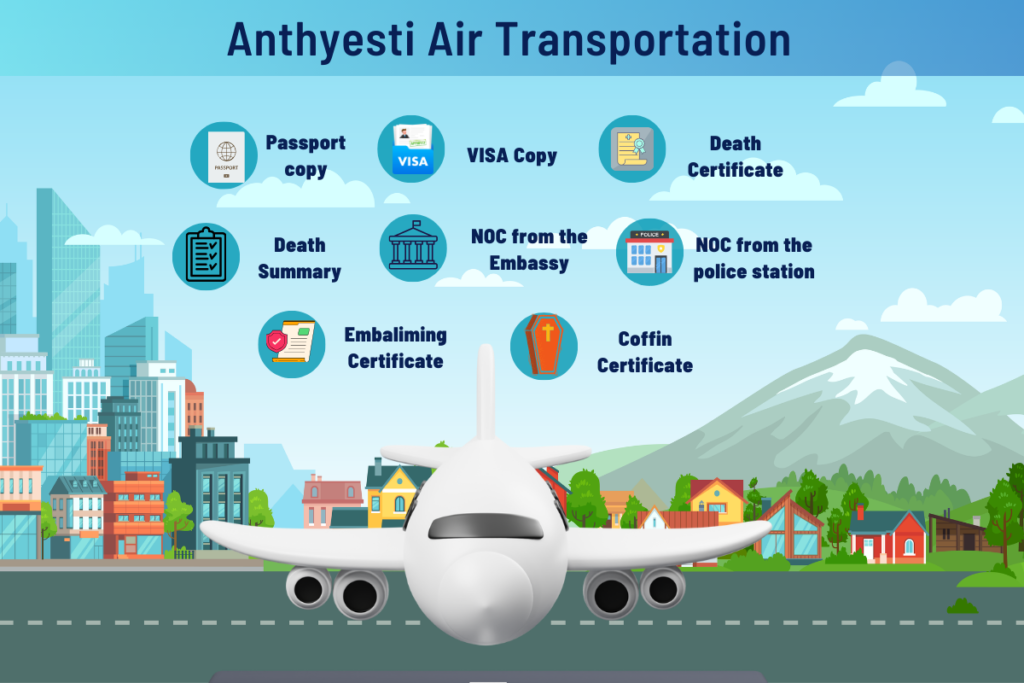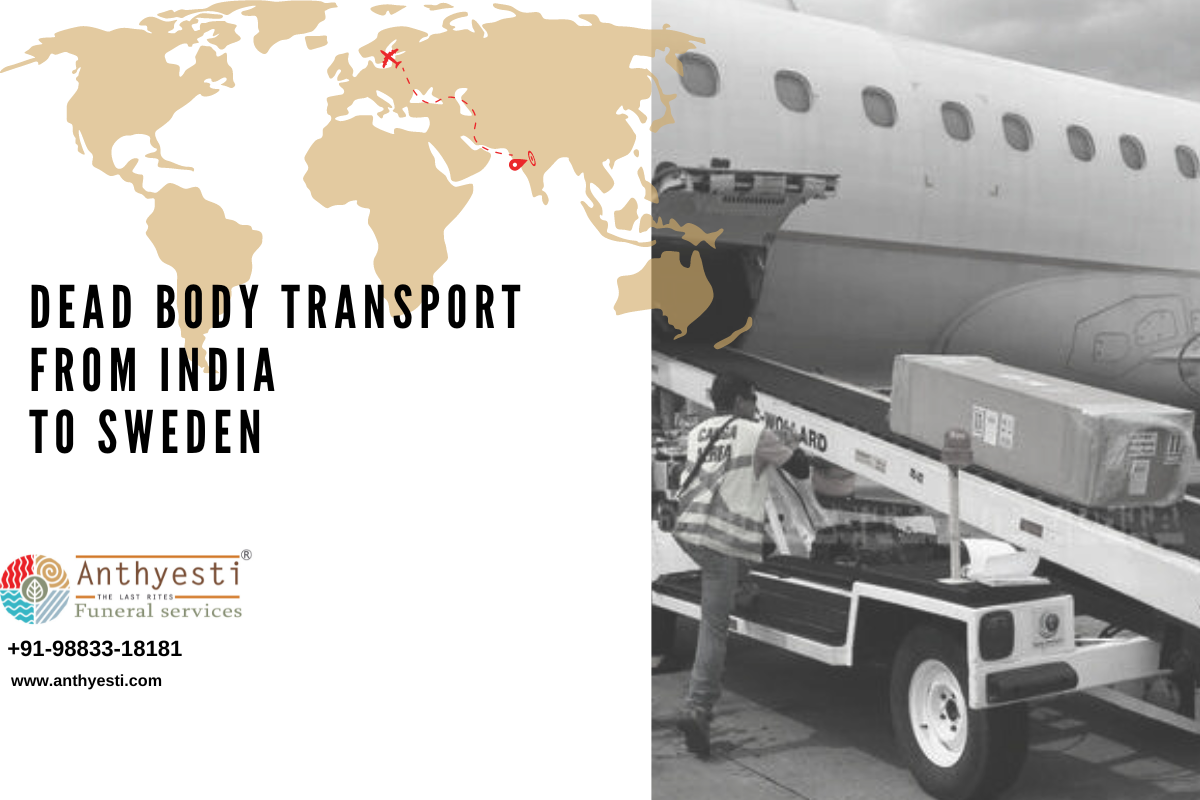Dead Body Transportation From India to Sweden
Dead body transportation from India to Sweden is the process of returning a deceased person’s body to their home country. It is a crucial service for families wishing to honor their loved ones with a funeral in their homeland. International repatriation involves complex logistics and legalities, requiring meticulous planning and coordination.
Legal Frameworks for Repatriation
International laws and bilateral agreements govern repatriation, ensuring respectful handling and compliance with health standards. Countries often follow guidelines from organizations like the International Air Transport Association (IATA).
International Agreements and Conventions
Countries use treaties like the Sweden Agreement to streamline repatriation, outlining cross-border procedures for transporting human remains. Understanding these agreements aids smoother repatriation from India to Sweden.
Initial Steps in the Repatriation Process
Notification of Death
The first step is to notify the relevant authorities of the death. This includes local law enforcement and the Indian embassy or consulate in Sweden. Timely notification is crucial for initiating the repatriation process.
Appointing a Funeral Director
Hiring an experienced funeral director is essential. They manage the logistics, documentation, and coordination with authorities. A professional with international repatriation experience handles the process efficiently and respectfully.
Coordinating with Local Authorities
Local authorities in India, including the police and health department, must be informed. They issue necessary permits and conduct required inspections. Cooperation with these authorities is vital to obtaining the documentation needed for repatriation.
Documentation Requirements
Death Certificate
A certified death certificate from the local municipal authority is mandatory. It confirms the death and is required for all subsequent documentation.
Embalming Certificate
An embalming certificate ensures the body has been preserved according to international standards. This is particularly important for long-distance transportation.
No Objection Certificate (NOC)
The NOC from the local police or magistrate confirms there are no objections to transporting the body. It is crucial for both the departure from India and the entry into Sweden.
Passport and Identity Documents
The deceased’s passport and identity documents are required to complete the documentation. These help verify the identity and nationality of the deceased.

Legal and Administrative Procedures in India
Obtaining Necessary Permits
Permits from health and police authorities are required to transport the body internationally. These include the NOC and clearance certificates.
Role of the Indian Ministry of External Affairs
The Ministry of External Affairs assists in coordinating with consulates and embassies, ensuring all international protocols are followed. Dead Body Transportation From India to Sweden Their involvement can expedite the repatriation process.
Embalming and Preparation of the Body
Accredited Embalming Services
Using accredited embalming services guarantees the procedure meets international standards. It is important to choose reputable providers to avoid complications.
Preparing the Body for Transportation
Beyond embalming, the body must be placed in a sealed casket. This casket is typically placed inside a larger, protective container to comply with airline regulations.
Choosing a Repatriation Service Provider
Criteria for Selection
Selecting a reliable repatriation service provider involves checking their credentials, experience, and customer reviews. Dead Body Transportation From India to Sweden The Anthyesti provider should have a proven track record of handling international repatriations efficiently.
Top Repatriation Service Providers
Researching and selecting top-rated providers ensures the process is handled professionally. Recommendations from consulates or embassies can also guide the choice.
Transportation Logistics
Booking the Flight
Booking a flight for repatriation requires coordination with airlines that handle human remains. Dead Body Transportation From India to Sweden The process involves checking flight availability and ensuring all documentation is in order.
Handling Airport Procedures
Navigating airport procedures involves dealing with customs, security, and health inspections. A well-prepared repatriation service provider manages these steps to ensure smooth transit.
Costs and Financial Considerations
Breakdown of Costs
Repatriation involves various costs, including embalming, documentation, transportation, and service fees. Understanding the breakdown helps in budgeting and planning.
Insurance and Financial Assistance
Some insurance policies cover repatriation costs. Dead Body Transportation From India to Sweden Additionally, financial assistance may be available through consular services or community organizations.
Customs and Import Regulations in Sweden
Customs Clearance Process
Upon arrival in Sweden, the body must clear customs. This involves presenting all required documentation and ensuring compliance with Sweden import regulations.
Documentation for Entry
Documents such as the death certificate, embalming certificate, and consular mortuary certificate are essential for entry into Sweden. Proper documentation ensures a smooth clearance process.
Working with Sweden Authorities
Coordination with Sweden authorities, including customs and health departments, is necessary to complete the repatriation. Their requirements must be met to avoid delays or complications.
Cultural and Religious Considerations
Cultural Sensitivities
Understanding and respecting cultural sensitivities is crucial in the repatriation process. Dead Body Transportation From India to Sweden This includes adhering to specific customs and practices related to death and burial.
Religious Practices and Customs
Different religions have distinct requirements for handling and transporting the deceased. Ensuring these practices are followed is important for the family’s peace of mind.
Conclusion
Transporting a deceased loved one from India to Sweden is a complex process that requires meticulous planning and coordination. By understanding the legal, logistical, and emotional aspects, families can ensure a respectful and smooth repatriation. Always work with experienced professionals and seek support to navigate this challenging time.
FAQs about Dead Body Transportation From India to Sweden
What are the first steps to take after a death abroad?
Notify the local authorities and the nearest consulate or embassy immediately. This initiates the process of obtaining the necessary documentation for repatriation.
What documents are needed for Dead Body Transportation From India to Sweden?
Required documents include a death certificate, embalming certificate, No Objection Certificate, consular mortuary certificate, and the deceased’s passport.
How long does the repatriation process take?
The process duration varies depending on the circumstances; however, it typically takes one to two weeks. Additionally, delays can occur due to documentation or legal issues.
Call us at +91-98833-18181

